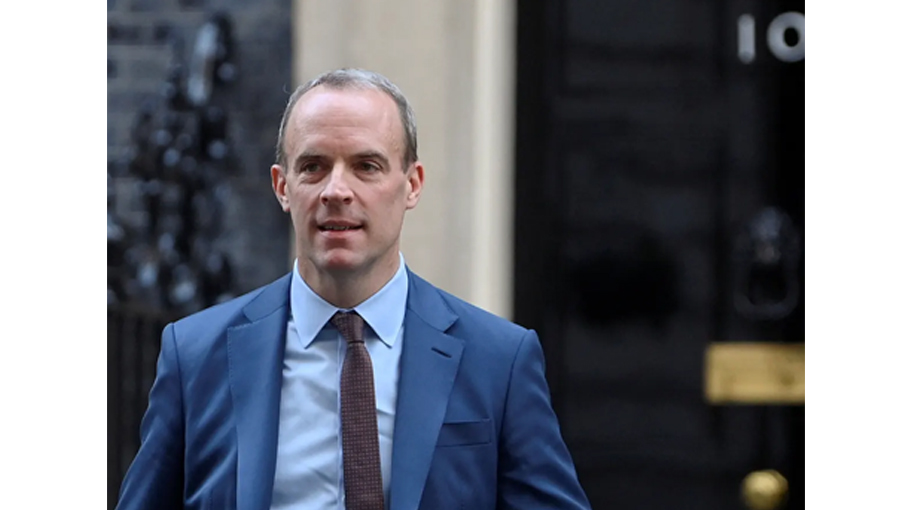UK leadership faces scrutiny after Raab’s resignation

Dominic Raab announced his resignation as UK's deputy prime minister and justice secretary on Friday via a Twitter post. This decision was prompted by the outcome of an official inquiry, which found that some of the allegations against him were valid.
Image Credit: AFP
Rishi Sunak is the “change candidate” that Britain’s Labour opposition most fears will undermine its claim to represent a viable alternative. The prime minister’s problem, however, is that while he has overhauled the tone, manner and — in many cases — performance of the government, he remains stuck with the same old Conservative party and the same cast of characters who brought it to a low point last year.
On Friday, Sunak lost his deputy prime minister, Dominic Raab, also the justice secretary, who resigned from both roles over a raft of allegations that he had been bullying civil servants, leading to an investigation ordered by No. 10. His exit may turn out to be a blessing in disguise.
Although there will be question marks hanging over Sunak’s judgement in appointing him in the first place, Raab has spared his boss the decision to back him or sack him. Either course could have placed the prime minister in jeopardy.
If Raab had clung to office, Labour would have accused the PM of bowing to pressure from the right wing of the Tory party. Had Sunak sacked him, however, he would have been accused of throwing a loyal supporter — strongly identified with driving through an uncompromising Brexit — to the wolves.
Brutal media campaign
Sunak won the leadership of the Conservative party last autumn when the government was at the nadir of its fortunes, its standing in opinion polls battered by Boris Johnson’s Partygate shenanigans. The abrupt departure of his immediate predecessor, Liz Truss, following an economic Dunkirk, then seemed to make defeat at the next general election inevitable.
Yet the prime minister’s deft handling of a series of knotty political problems and air of cheerful competence has made Labour doubt that victory is in the bag. In response, the opposition has been targeting the prime minister’s character with a brutal digital media campaign that has even turned the stomachs of some members of the Shadow Cabinet team.
Upon entering No. 10, Sunak promised that his government would be marked by “integrity, accountability and professionalism”. But the prime minister brought back into office several politicians who should have been put out to grass.
Within weeks, he had to push out one Cabinet minister whose talents lay in Machiavellian scheming, not administration, over complaints that he had bullied his colleagues. Another senior minister, NadhimZahawi, who failed to come clean about his tax affairs, was sacked after a swift official inquiry.
Raab was already damaged goods when Sunak brought him back with the same grand titles he’d enjoyed under Johnson. At the Foreign Office, he had blotted his copybook by failing to return to the office from holiday in Greece when Afghanistan dramatically fell to the Taliban.
British nationals and loyal local support staff were evacuated from Kabul amid chaos. Raab’s defence was that “the sea was actually closed” while he worked from his hotel — inelegant phrasing in such situations compound the impact. When the media storm grew too fierce, he was shunted to the Justice Department.
But Raab was a Sunak loyalist, a fellow Brexiteer who shared his boss’s political vision. As Adam Tolley’s reflections on his style also show, he is a diligent and dogged minister who backed the prime minister’s his first leadership bid even when other supporters peeled away after Truss emerged as the more showy favourite.
Despite his sundry mishaps, Raab has a sharp lawyerly brain and had never obviously failed in his role as deputy, so he was given a second chance.
Yet the departing minister’s character has made him many enemies. Complaints about his conduct toward civil servants — though not yet official — were legion and followed him from department to department. Raab’s defenders say he was a tough boss but not an “unreasonable” one.
But times and requirements change: Conduct that might have been acceptable in a manager 20 years ago seems “unreasonable” today — or at least likely to lead to trouble. The cultural shift goes a lot broader than Whitehall.
Tories, already paranoid about “no-can-do” obstruction and alleged political bias in Whitehall, fear that what Raab refers to as “unionised” civil servants have been handed a weapon to get rid of unpopular ministers.
In the short term, the headlines about Raab’s resignation will be terrible. But who will care about the fate of another anonymous politician — little known outside the “bubble” while commanding much attention within it? After all, the last two departures from the Cabinet on Sunak’s watch hardly created a ripple.
The prime minister can now try to mold a more electorally presentable Cabinet team and bring more newcomers into the mix to reflect his “new broom” style. He is also rid of a stormy petrel. The deputy prime minister was, it turned out, more useful to Labour in office than out of it.
Martin Ivens is the editor of the Times Literary Supplement. Previously, he was editor of the Sunday Times of London and its chief political commentator. Source: Bloomberg



